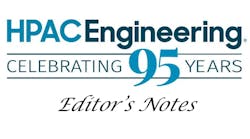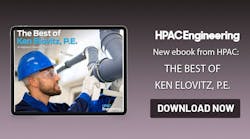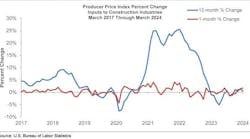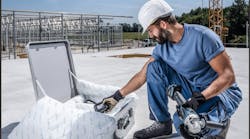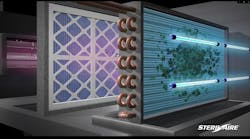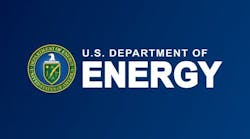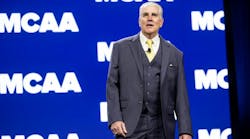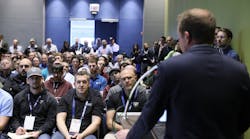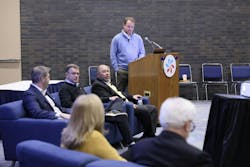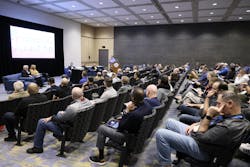Writing for Contracting Business, HPAC Engineering, and CONTRACTOR magazines last month, our intrepid reporter Kelly Faloon was everywhere in Chicago last month. She filed stories from these special sessions at AHR Expo. Each entry is posted at www.contractingbusiness.com.
HVACR State of the Industry
January 23, 2024
Industry leaders discussed heat pumps, artificial intelligence (AI), refrigerants, and technician recruitment during a panel discussion Jan. 23 at the 2024 AHR Expo in Chicago: Ginger Scoggins, president of ASHRAE; Talbot Gee, CEO of HARDI; Steve Yurek, president of AHRI; Dominick Guarino, CEO, National Comfort Institute; Gregg Walker, CEO of ASHB; and moderator Bryan Orr, founder/president of HVAC School and Kalos Services.
Gee noted there was still hesitation in the market regarding heat pumps: "Contractors need to be the authority on the technology; they'll be heroes if they take that on."
Orr added that heat pumps require a different skill set, making heat pumps a "big lift" for some contractors.
Moving to AI, Guarino said that contractors "blindly rely" on building controls. Training is crucial in this area to ensure that building controls with AI use good information; verification is critical to this process.
"Engineers design complicated systems with building controls," noted Scoggins. "Commissioning agents should be documenting these systems so contractors don't scrap the design and install what they want."
Talbot told attendees that the date for the U.S. transition to mildly flammable A2L refrigerants was extended for a year. Yurek noted that the need to reclaim today's refrigerant was needed even more to ensure customers are not left hanging at the end of the year when R410a is no longer to be used.
"Refrigerant reclamation is important to serve your customers and the environment; there is value in that refrigerant," he said.
On the topic of workforce development, Guarino noted the industry needs more nontraditional training and "fast-track" programs to get more HVAC technicians into the industry to help customers. He also noted that many HVAC schools have old equipment; they should have new equipment, donated by manufacturers, so students are learning with the latest technology before starting their careers.
######
The Coming Disruption of 'AI'
January 23
Artificial intelligence (AI) has been in the news a lot in the past year, and some are wary of this technology. However, for home services contractors, AI can help with the office processes no one likes to do, such as answering after-hours calls, outbound dialing, and helping with overflow.
"AI is not to replace staff but to enhance them," said Joshua Crouch, co-host of Skilled Trade Syndicate's Service Business Mastery podcast, told 2024 AHR Expo attendees Jan. 22 in Chicago.
Crouch and his podcast co-host (and founder) Tersh Blissett have used many AI apps and software and believe AI can help contractors be more productive. Blissett noted that AI can produce robust reports on service call management, monitor equipment remotely, and analyze data.
However, he added, users must be aware of what information they are sharing in the AI space. Thoroughly review the vendor's privacy policy, and examine your company's cybersecurity systems to ensure you are protected.
Blissett said to always review all AI-written content; this is especially true when having AI respond to negative reviews online.
Both speakers stressed that contractors should start learning about AI and how it can be used in their businesses ASAP. Bottom line: It is not a fad and it is not going away.
######
'AI', Controls and the Future of HVACR Technology
January 24
"Our industry evolves at a glacial pace, but it's exciting to be at this new precipice of AI," noted Stephen Holicky from Tridium, speaking Jan. 23 at a 2024 AHR Expo panel discussion. The panel also included Greg Walker of ASHB (moderator), Chad Langston from ABB, Charles Pelletier of Distech Controls, Darryl DeAngelis of Ebtron, and Anto Budiardjo of PADI.io.
"If we want to move forward [with AI], we have to do more than the minimum in standards," DeAngelis said.
For those worried about AI taking their jobs: "AI is not going to replace people who know the buildings," Langston noted. "The human element is still needed."
Budiardjo agreed: "Remember, it is a tool to help us."
DeAngelis added: "AI can help fill jobs and make companies more efficient."
Predictive maintenance seems to be a key driver for using AI in buildings, allowing systems to work more efficiently.
######
How IAQ Products Can Make You a Market Leader
January 23
During the COVID-19 pandemic, people became more aware of internal air quality (IAQ) and how it can affect their health. Today, there is still a "heightened awareness" of IAQ's importance in the health and safety of families and communities, noted Scott Tinder, training and instructional designer at Business Development Resources, before 2024 AHR Expo attendees.
"People are actively asking for IAQ, especially post-COVID," he said. "Today, wholesale distributors have about 100 SKUs of IAQ products."
To become an IAQ leader in your market, you need to be proactive: "In HVAC today, you have to be a pioneer."
His presentation, "Three Ways You Can Use IAQ Products to Become the Leader in Your Market," discussed:
- Improve company profitability by offering IAQ on every sales and service call, with a goal of selling one IAQ product per day (to start);
- Leverage your existing revenue producers (technicians) for these additional sales;
- Enhance recruiting and retention by rewarding IAQ success.
Tinder added that you must get buy-in from techs; and install IAQ products in their homes so they can see for themselves how the technology works.
For consumers, ensure you have an easy process and financing options. "If you don't, they'll buy from Amazon, Home Depot, or Lowe's," he said.
######
The Gap in Workforce Development, Recruitment and Retention
January 24
How do we attract talent to the HVACR industry? How do we keep those workers? How do we help them move forward in their careers? These were the questions tackled at the Jan. 24 panel discussion at the 2024 AHR Expo in Chicago.
Panelists were: Alison Neuman, North American workforce development program manager at Johnson Controls; Bryan Feilen, senior corporate account manager, Lincoln Tech; Scott Shaw, president and CEO of Lincoln Tech; Jose De La Portilla, senior manager of education and training, Rheem Mfg.; Byran Orr, founder/CEO of HVAC School and Kalos Services; and moderator Dominick Guarino, president and CEO of the National Comfort Institute.
The discussion started with an overview of a joint project between Johnson Controls and Lincoln Tech: JCI Academy, launched in early 2023. The program provides six weeks of intensive training toward full-time employment, as well as housing near the Lincoln Tech campus in Columbia, MD. It was created to provide a pathway to employment at Johnson Controls locations throughout the United States; students transition to JCI positions around the country, with relocation assistance provided.
"We've had 110 graduates so far," Neuman said.
Feilen added: "The program instills confidence, and we have a 95% retention rate."
The biggest problem, according to De La Portilla, is that people don't know about the industry. "We don't let enough people know about the industry and the careers that it offers," he said.
Shaw noted that schools are "desperate" for help, so partnering with a local school would get your company – and what you do – in front of young people.
Company culture is a big part of why techs may choose your company – and why they may eventually leave. Panelists agreed that culture needs to be supportive of workers, especially when trying to attract/keep Gen Z workers.
######
Heat Pumps, Electrification, and The Grid
January 24
"Climate change is the HVAC design challenge," Jon Heller, P.E., president of Ecotope, noted at a Jan. 23 panel discussion at the 2024 AHR Expo in Chicago. Rand Conger, principal at Johnson Barrow, and Sean Jarvie, chief technical officer at Flow Environmental Systems, rounded out the panel.
"The start of decarbonization began with VRF," Conger said. "Today's hydronic heat pumps [also known as air-to-water heat pumps] require thermal storage. It ensures minimum run times and preserves equipment life."
Jarvie explained four keys to decarbonize with heat pumps:
- No new power feed is needed;
- Save space and simplify;
- Match existing load conditions; and
- Plan for the future.
"Have a strategy for what's available now and in five years from now," he added.
######
Decarbonization Can Make Every Building an Asset
January 24
"Decarbonization can be unifying or very divisive," noted Kimberly Llewellyn, senior product manager for emerging markets at Mitsubishi Electric Trane HVAC US, on Jan. 24 at the 2024 AHR Expo in Chicago. "However, we're fighting for stewardship of precious resources."
When looking at decarbonization, stakeholders need to "choose their lens," she said: asset/investment risk management, climate justice and preservation, and financial opportunities.
A Forbes magazine article noted that millennials are looking at sustainable investments; they are "the next wave of investors" in the sustainability space, Llewellyn said.
Strategies for decarbonization of the built environment include reducing building loads, maximizing financial benefits, engaging all key stakeholders, reducing refrigerant impact, and building out electric infrastructure.
The missing link is quality data monitoring, Llewellyn noted. Data points to examine are occupancy. mode of operation, setpoint, temperature/relative humidity, local exhaust ventilation position, return/supply air temperature, liquid/gas line temperature, and total capacity.
Llewellyn gave a quick rundown on regulatory changes engineers and contractors should be aware of:
- 2023: Efficiency Changes and the Inflation Reduction Act
- DOE efficiencies and M1 (SEER2/HSPF2)
- Energy Star 6.1 and CEE
- 25C tax credit
- High-Efficiency Electric Home Rebate Program
- HOMES
- 2024: Low Global-Warming Potential (A2L) Refrigerants Referenced
- UL 60335-2-40
- Uniform Mechanical Code
- International Residential Code
- International Mechanical Code
- California Mechanical Code
- 2025: Low GWP Refrigerant Transition, Part 1
- Single zone
- Multizone
- Single phase
- Less than 65,000 Btuh systems, GWP less than 700
- 2026: Low GWP Refrigerant Transition, Part 2
- VRF
- Three phase
- Less than 65,000 Btuh systems, GWP less than 700
- 2030: Low GWP Refrigerant Transition, Part 3
- No HCFC manufacture or import
"Every building should be an asset, not a liability," she said. "And buildings should be things people are drawn to."
######
Maximizing HVACR Financing Strategies
January 24
What do you consider expert service? Is it good communication, quick response time, easy scheduling, a professional staff, going above and beyond for the customer, and quality equipment?
What about offering multiple payment options, such as cash, credit cards, or financing through an installment loan?
Kelsi Cooper, an inside sales manager at FTL Finance, and Andrew Lockman, an account executive at FTL, discussed customer financing on Jan. 24 with attendees at the 2024 AHR Expo in Chicago.
They noted that the average U.S. credit score (FICO) hasn't increased; in 2022, 20% of FICO scores decreased by at least 20%.
"It's alarming across all FICO ranges," Lockman said.
While HVAC contractors may prefer customers with high credit scores, he noted they may be missing opportunities with those with lower scores. Those homeowners may not have enough money in their bank accounts or on their credit cards to pay for a needed repair or replacement – contractors can maximize financing by offering it to this "underserved market."
Cooper explained that financial institutions like FTL are considered prime lenders (lending to consumers with credit scores between 660 and 719) and near-prime lenders (lending to consumers with scores between 620 and 659).
Subprime lenders serve the underserved market (credit scores between 580 and 619). They also look at more than credit scores.
Customers who apply for these contractor financing programs and don't qualify for prime or near-prime loans will have their applications sent to a subprime lender (no additional application required.)
"Choose a lender with options to cover a range of credit scores," Lockman added.
They concluded that every homeowner deserves the option of a loan, even those with low credit scores. "It's not a scarlet letter," Cooper added.
######
Creating Climate-Resilient HVAC Systems
January 24
Last year was the warmest year since global records began in 1850, and global temperatures will continue to rise, according to Climate.gov. This warming has manifested in extreme climate events and violent storms.
What happens to HVAC systems when these weather events occur? Many times, people lose power – no heat, no air conditioning – for days or weeks at a time. The development of resilient building systems and HVAC technology must be a priority for the industry.
Bill Spohn, P.E., president and CEO of TruTech Tools; Eric Kaiser, industry engagement manager of TruTech Tools; and Ben Lipscomb, P.E., director of engineering and utility services at National Comfort Institute, spoke on these subjects Jan. 24 at the 2024 AHR Expo in Chicago.
Kaiser explained how heat pumps combined with proper insulation and a generator can keep people comfortable until professionals can restore power and make repairs.
Lipscomb discussed five climate-resilient HVAC goals:
- Dramatically reduce emissions relative to fossil-fuel heat sources;
- Limit negative impacts on electricity grid reliability;
- Handle potential for higher average temperatures and more extreme weather events;
- Provide essential services (such as heating) in an extended grid outing event;
- Provide pricing flexibility through peak demand management or fuel flexibility.
He also described best practices in building and system assessment, equipment selection, duct system sizing, home performance improvements, and installation and commissioning.
Spohn ended the session with his experiences building a home with Passive House design. "New construction is not immune" to heating problems. After investigations and troubleshooting, he discovered that his heat pump system was installed by someone on the general contractor's payroll, not a professional HVAC technician.
The solution implemented by a trained HVAC technician was to replace the complete refrigerant circuit (two coils and line set) using proper tools and processes.
##########
